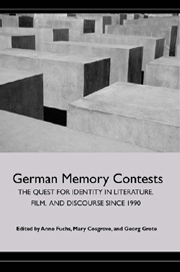Book contents
- Frontmatter
- Contents
- Acknowledgments
- Introduction: Germany's Memory Contests and the Management of the Past
- Positions
- 1 What Exactly Is Vergangenheitsbewältigung? Narrative and Its Insufficiency in Postwar Germany
- 2 The Tinderbox of Memory: Generation and Masculinity in Väterliteratur by Christoph Meckel, Uwe Timm, Ulla Hahn, and Dagmar Leupold
- 3 Telling It How It Wasn't: Familial Allegories of Wish-Fulfillment in Postunification Germany
- Mediations
- Ethnicity/Hybridity
- Memory Politics
- Works Cited
- Notes on the Editors and Contributors
- Index
2 - The Tinderbox of Memory: Generation and Masculinity in Väterliteratur by Christoph Meckel, Uwe Timm, Ulla Hahn, and Dagmar Leupold
from Positions
Published online by Cambridge University Press: 05 February 2013
- Frontmatter
- Contents
- Acknowledgments
- Introduction: Germany's Memory Contests and the Management of the Past
- Positions
- 1 What Exactly Is Vergangenheitsbewältigung? Narrative and Its Insufficiency in Postwar Germany
- 2 The Tinderbox of Memory: Generation and Masculinity in Väterliteratur by Christoph Meckel, Uwe Timm, Ulla Hahn, and Dagmar Leupold
- 3 Telling It How It Wasn't: Familial Allegories of Wish-Fulfillment in Postunification Germany
- Mediations
- Ethnicity/Hybridity
- Memory Politics
- Works Cited
- Notes on the Editors and Contributors
- Index
Summary
Väterliteratur and the Language of Silence
Väterliteratur (fathers' literature) could be considered a late byproduct of the student movement of 1968 in that some of its former members embarked on a literary exploration of postwar German family life in the late 1970s. Concerned with the authoritarian father figures that, according to these authors, dominated the family dynamics of the postwar period, these novels attempt to show how the National Socialist past of the war generation infiltrated postwar family life. Wavering between a whimsical style on the one hand and outright aggression towards the domineering father figure on the other, these narratives have been dismissed by some critics for their apparent lack of critical distance and the shrillness of their tone.
A case in point is Ernestine Schlant, who discusses the genre in her 1999 study The Language of Silence and notes that the majority of these narratives share so many substantive, linguistic, and structural similarities that they are “virtually formula novels.” For Schlant, the genre largely fails to make the important connection between family life and political practice. This narrative insufficiency is further compounded by the genre's failure to come to terms with the Holocaust. Although she concedes that many of the narratives “approach the Holocaust subjectively, through the narrator's attempt at conversations with their elders,” she deplores the peripheral role of Jews in this literature: “In narratives that are full of one specific sort of affect — anger against the parent and rage at the mistreatment of the child — there is a curious lack of affect when it comes to the Holocaust” (Schlant, 92–93).
- Type
- Chapter
- Information
- German Memory ContestsThe Quest for Identity in Literature, Film, and Discourse since 1990, pp. 41 - 66Publisher: Boydell & BrewerPrint publication year: 2006



